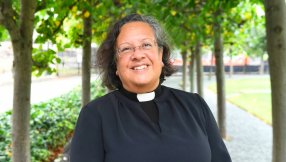Palestine’s Christians Continue to Suffer Persecution
Israeli attorney and author, Justus Reid Weiner, has just penned a new book, ‘Human Rights Christians in Palestinian Society’, based on eight years of research into the human rights abuses directed at Muslims who converted to Christianity.
Originally he “doubted that anyone would victimize the adherents of the world's largest religion.”
He told Crosswalk: “But as I began to schedule interviews, I quickly learned that most of the Christian victims were reluctant to even meet me. If they agreed to reveal what they had suffered, they insisted that I refer to them by a pseudonym.”
|QUOTE|According to Don Finto, pastor and author of ‘God’s Promise and the Future of Israel’, due for release in February, the persecution is happening primarily within the Palestinian territories.
The situation for Arab Christians within Israel, according to the author, is relatively peaceful, due to much greater acceptance and little persecution.
"Jewish people who are believers - perhaps 7,000 to 10,000 now in 130 different house groups or congregations/synagogues - are mostly tolerated, sometimes persecuted, often severely, especially by the ultra orthodox.
“The secular (80 percent of Israeli Jewish citizens are secular-cultural Jews, but not religious. They observe Passover and may even close stores etc. on Sabbath, but they are not people of significant faith) usually do not care, and even sometimes are more tolerant of the Jewish believers in Jesus than they are the ultra orthodox who want to control the country," said Finto.
|AD|“Bethlehem is no longer controlled by Israel, but by Palestinians, often hostile Muslims who accept traditional Christians who have been Christians for generations, but if a Muslim turns to faith in Jesus, he may be killed by his own family members. The evangelistic work is going forward, but has to be done very carefully, wisely and under the direction of the Holy Spirit.”
Following numerous interviews with Palestinian Christians who have experienced persecution and abuse because of their faith, Weiner concluded, “The worst treatment is often ‘reserved’ for persons who leave Islam to become Christians.”
Despite witnessing Christian persecution firsthand in the Palestinian territories, Weiner said it is often hard to assess or control persecution.
“Persecution is very hard to measure. If nobody complains does it mean that there is no persecution. It could, but in the case of the Christians living under Palestinian rule this would not be a reasonable conclusion," said Weiner.
He said that Palestinian Christians “live within an atmosphere of intimidation and denial”, which is “particularly true of many of their religious leaders”.
“Since Israel withdrew from the Palestinian cities and towns, it has very little influence over the way the Palestinian Authority and its' Muslim population behave. Moreover even humanitarian efforts by Israelis to stand up for Christians can backfire as they may be accused of being Israeli agents, a virtual death sentence in the armed anarchy of the Palestinian streets,” he said.
Weiner spoke of a pastor who was shot and left for dead at a church which was attacked 14 times.
He said in this kind of atmosphere and partially as a consequence of these attacks, “thousands are leaving the cradle of Christianity”.
“According to my estimate, if current trends continue, only the relics and holy sites will be left in another 15 years. The Christian community in Bethlehem will cease to exist,” he said.
Finto echoed this prediction: “It's so hard for Palestinian Christians to live there in Bethlehem, that they are leaving when they get a chance to leave...Somehow, they are making it very uncomfortable for them, and putting pressure on them to be pro-Palestinian, governmentally."













